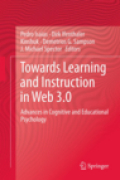
Towards learning and instruction in web 3.0: advances in cognitive and educational psychology
Isaias, Pedro
Ifenthaler, Dirk
Sampson, Demetrios G.
Towards Learning and instruction in Web 3.0 , which includes selected expanded papers from CELDA (Cognition and Exploratory Learning in the Digital Age) 2010 (http://www.celda-conf.org/) addresses the main issues concerned with evolving learning processes, innovative pedagogies, and technology-based educational applications in the digital age. The convergence of these two disciplines continues to increase and in turn, affects the academic and professional spheresin numerous ways. Towards Learning and Instruction in Web 3.0 addresses paradigms such as just-in-time learning, constructivism, student-centered learning and collaborative approaches which have emerged and are being supported by technological advancements such as simulations,virtual reality and multi-agents systems. This volume touches on both technological as well as psychological andpedagogical issues related to the developments of Web 3.0. Represents the latest work in the area where Web 3.0, information and communications technology, learning psychology and instructional design intersect.Includes detailed information on the newest technical advances and applications in educational technology. Represents a genuine multidisciplinary approach by presenting chapters by practitioners and researchers from a variety of fields involved in informational technology, design, and cognitive psychology. Contains cutting edge, relevant papers from the CELDA 2010 (Cognition and Exploratory Learning in the Digital Age) Conference . INDICE: -1. SQAR: An Annotation-Based Study Process to Enhance the Learner's Personal Learning.-2. Integrating Digital Games into School Curriculum: A Field Experiment in Math Education.-3. The Need of Full-Featured Web-Based Formative Assessment In a Medical PBL-Curriculum: Students', Lecturers' and Theory's View.-4. The Stringprinter: First Steps Toward Child-Friendly Fabrication Devices.-5. Beyond Playing with Lego Bricks: Modeling Interaction between Behavioral Artifacts.-6. Collaborative Language Learning as a Device Independent Application.-7. Epistemological Beliefs and Ill-Defined Problem-Solving in Solo and Duo Contexts.-8. Aligning Technologies and the Curriculum: A Snapshot of Academic Practice.-9. Real World, Student Selectable Data for Education - Learning Graph Algorithms.-10. E-Mentoring in Vocational Teacher Education.-11. AnArchitecture for Dynamic Student Modelling of Learning Styles in Learning Systems and its Application for Adaptivity.-12. Individual Differences in Different Level Mental Rotation Tasks: An Eye Movement Study.-13. Assessing the Effictiveness of Prompts for Self-regulated Learning.-14. Assessment of Motivation in Gaming Based E-Learning.-15. A Creation of the Message Transformation from Movie into Information Design.-16. An Analysis of Answer Selection Patterns from Multiple choice Items.-17. Robot Technology and Numbers in the Classroom.
- ISBN: 978-1-4614-1538-1
- Editorial: Springer New York
- Encuadernacion: Cartoné
- Páginas: 364
- Fecha Publicación: 28/01/2012
- Nº Volúmenes: 1
- Idioma: Inglés
